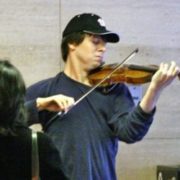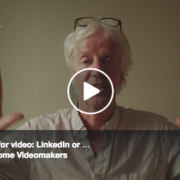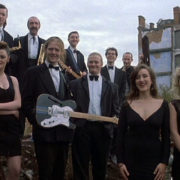Joshua Bell Subway Video: How to be ignored & unpopular
Here‘s a story about great talent going unnoticed.
The Joshua Bell subway video shows Joshua Bell playing incognito in the Washington D.C. metro station was organized by the Washington Post as part of a social experiment about perception, taste, and priorities of people.
The questions they were asking:
[bctt tweet=”In a commonplace environment at an inappropriate hour do we perceive beauty?”]
Do we stop to appreciate it? Do we recognize talent in an unexpected context?
Why is great talent not enough?
“A man sat at a metro station in Washington DC and started to play the violin; it was a cold January morning. He played six Bach pieces for about 45 minutes. During that time, since it was rush hour, it was calculated that 1,100 people went through the station, most of them on their way to work.
Three minutes went by, and a middle aged man noticed there was a musician playing. He slowed his pace, and stopped for a few seconds, and then hurried up to meet his schedule.
A minute later, the violinist received his first dollar tip: a woman threw the money in the till and without stopping, and continued to walk.
A few minutes later, someone leaned against the wall to listen to him, but the man looked at his watch and started to walk again. Clearly he was late for work.
The one who paid the most attention was a 3 year old boy. His mother tagged him along, hurried, but the kid stopped to look at the violinist. Finally, the mother pushed hard, and the child continued to walk, turning his head all the time. This action was repeated by several other children. All the parents, without exception, forced them to move on.
In the 45 minutes the musician played, only 6 people stopped and stayed for a while. About 20 gave him money, but continued to walk their normal pace. He collected $32. When he finished playing and silence took over, no one noticed it. No one applauded, nor was there any recognition.
No one knew this, but the violinist was Joshua Bell, one of the most talented musicians in the world. He had just played one of the most intricate pieces ever written, on a violin worth $3.5 million dollars.”
Two days before his playing in the subway, Joshua Bell sold out at a theater here in Boston where the seats averaged $100.
The real story behind the Joshua Bell subway video
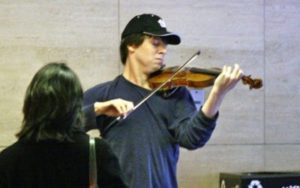 What bothers me about this story is not that Joshua Bell went unnoticed – it’s the suggestion that since he was ignored there must be something wrong with us and that if we can’t take a few minutes out of our day to notice great talent then we’re kind of doomed to a boring, mundane, existence.
What bothers me about this story is not that Joshua Bell went unnoticed – it’s the suggestion that since he was ignored there must be something wrong with us and that if we can’t take a few minutes out of our day to notice great talent then we’re kind of doomed to a boring, mundane, existence.
No. I can’t accept this.
What bothers me is that this story is like the one about the king who disguises himself as a beggar and goes out among the common folk – and then ends up being surprised that no one recognizes or accepts him as king once he reveals himself.
There are situations every day of the year where a great many talented people are practicing their craft – and yet they are getting a response equivalent to people ignoring Joshua Bell in the subway.
The simple truth: your talent is not enough
Many of us believe that if we put in the work and we hone our skills and we become the best at what we do – that our talent will shine through and people will recognize and reward us with their patronage.
Actually, you’re story will likely end up like the Joshua Bell subway video. You’ll be ignored.
I know that Joshua’s performance was meant as an experiment and that he purposefully did nothing to showcase himself – except to play his violin. But let’s imagine what he might have done to attract some attention.
Location, Location, Location
Joshua’s first mistake was that he was playing near the entrance to the subway. Everyone knows that early morning commuters are notoriously in a hurry and that when they enter a subway station they will hurry on down to the train platform almost no matter what. On the other hand, the train platform itself has a captive audience – because no matter how much of a hurry you’re in – you’re not going anywhere until the next train comes.
Joshua could have placed himself on a platform and, in between train arrivals, he could have been playing his heart out to an audience that he knew would be forced to wait and listen.
This is important. No matter what it is that you do – you can find an audience that will love your work. Where do they hang out? Where could you find the equivalent of a captive audience? Go there.
Anticipation
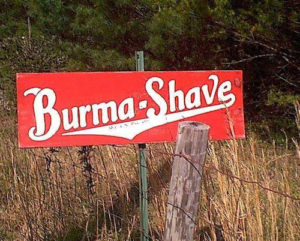 There was a time when all across the United States there were little signs put up along the highway with clever little rhymes. This was an ad campaign by Burma Shave. The series was always in the same structure: four signs each with one line of a rhyme – always humorous with a punch line.
There was a time when all across the United States there were little signs put up along the highway with clever little rhymes. This was an ad campaign by Burma Shave. The series was always in the same structure: four signs each with one line of a rhyme – always humorous with a punch line.
For example:
Don’t put your elbow
Out too far
It may go home
in another car
(there was always a fifth sign that said ‘Burma Shave’ – the ad part)
I remember traveling across the country in my family’s station wagon (at five years old) looking eagerly for the next signs and reading each one aloud. The anticipation was half the fun. I also remember that people made up their own rhymes – as a kind of parody – always ending with ‘burma shave’ which turned out to be an amazingly creative viral strategy for the company.
(full disclosure – the above example may, in fact, be one of the parody rhymes – it’s the only one I can remember off the top of my head)
Not Another Roadside Attraction
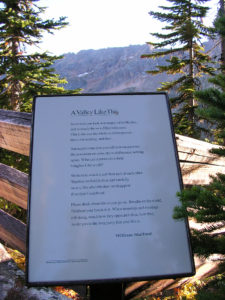 Two decades ago the poet William Stafford used this exact same technique to showcase his poetry. Stafford, a very talented and celebrated poet from Washington state, was grappling with the challenge of how exactly do you bring poetry to the mainstream? How can you get mom and dad and all the kids reading poetry together?
Two decades ago the poet William Stafford used this exact same technique to showcase his poetry. Stafford, a very talented and celebrated poet from Washington state, was grappling with the challenge of how exactly do you bring poetry to the mainstream? How can you get mom and dad and all the kids reading poetry together?
Well, he published a series of poems as roadside attractions along a lonely stretch of highway in the Methow Valley in Eastern Washington. His poems were each placed on weatherproof signs at a series of road turnouts along the route – usually where there was also an incredible view of the natural scenery of the North Cascade Mountains.
A Valley Like This
Sometimes you look at an empty valley like this
and suddenly the air is filled with snow.
That is the way the whole world happened –
there was nothing, and then…
But maybe sometime you will look out and even
the mountains are gone. the world become nothing
again. What can a person do to help
bring back the world?
We have to watch it and then look at each other.
Together we hold it close and carefully
save it, like a bubble that can disappear
if we don’t watch out.
Please think about this as you go on. Breathe on the world.
Hold out your hands to it. When mornings and evenings
roll along, watch how they open and close, how they
invite you to the long party that your life is.
By going to where his target group would be and speaking directly to them, William Stafford captured his audience.
As a result his poetry has been read, and shared, by a larger and far more diverse population.(note these poems were all posted in the pre-internet era.)
You can accomplish the same level of engagement that Stafford did by speaking simply and directly to your audience and addressing their desires.
Imagine if, back in the subway, Joshua Bell had collaborated with a poet who wrote out four lines of poetry about the beauty of music played on a violin – and these lines were then placed on four signs leading to Joshua’s location on a train platform (where everyone would have to listen while waiting for the next train)?
How many would Joshua have engaged then?
Want to harness your audience’s anticipation – and convert your customers into raving fans? Then join my FREE Video Creators Lab group on Facebook

